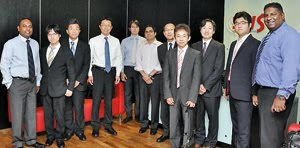The Central Bank is further relaxing foreign exchange regulations next month under its current policy of liberalising foreign exchange, as reserves improve and the new rules will include allowing fund transfers between NRFC accounts.
 Central Bank Governor Ajit Nivard Cabraal said guidelines for these new regulations to be announced in mid-June are in line with the CB reforms to facilitate foreign exchange transactions and make it easier to do business.
Central Bank Governor Ajit Nivard Cabraal said guidelines for these new regulations to be announced in mid-June are in line with the CB reforms to facilitate foreign exchange transactions and make it easier to do business.“There are about seven or eight new things happening,” he told the Business Times. Among them are in addition to opening out NRFC accounts to allow internal transfers, students to be permitted to open accounts overseas when on studies and a set of guidelines for local companies to list shares on foreign stock-exchanges.
The last-named proposal (listing shares overseas) was announced last year but no guidelines were issued. The Central Bank has been relaxing foreign exchange regulations over the past 18 months in a bid to prop up the economy in the post-war period.
The last time the Bank announced similar measures was in November where foreigners were permitted to invest in Rupee Denominated Debentures issued by local companies; expediting approvals for companies to borrow from foreign sources; permission for foreign companies to start businesses in Sri Lanka; foreigners on tour or business in Sri Lanka to open accounts in foreign currency; foreign diplomats and their families to transact in foreign currency and Sri Lanka rupees, and permission for insurance companies to invest a part of their assets abroad, among others benefits.
Asked about any forthcoming bond issues, the Governor said the Government has factored in foreign borrowings in the budget and there are many ways to resort to this. “Our options are fairly wide – we can raise Sri Lanka Development Bonds; we can enhance the limits we have in our treasury bonds or we can have international bonds in Dollars or treasury bonds in Euros. We have many options and we have to evaluate carefully which one is the best,” he said.
The Bank has invited proposals from some international investment banks for investment advice on bonds. “This is a highly complex market and needs advice. We will use this advice and also look at the best time, what is the best instrument, what is the best tenor, what is the best quantum,” he said adding the proposed bond issue would be for budget support and debt repayment. The Bank is expected to launch the issue before October.
Related Info :
• Foreign Loans for Local Entrepreneurs in Sri Lanka. Procedure for Granting Permission Introduced
• Sri Lanka Relaxes Exchange Controls from March 11 in the First Phase of Foreign Exchange Liberalization Plan
• Sri Lanka Relaxes Foreign Exchange Regulations. Allows Foreigners to Invest in Corporate Debt & Open Businesses, Locals to Borrow & Invest Overseas


































